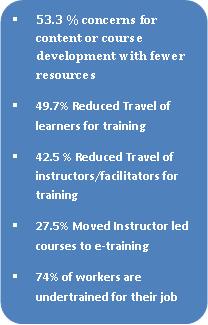One can debate whether or not we are moving out of a recession; however, one thing that is certain – our current economy is centered on cutting costs. 85 to 90 percent of a business’ operating costs are comprised of labor expenses. As a result, companies minimize these costs by laying off employees.
For the workers that remain, job security is of great concern to them. Learn how to become indispensible at work. Below are some tips to build your personal strategic plan and maximize your value on the job:
Brand Yourself
 One of the best preventive ways to ensure you survive company downsizing is to create and market “your brand.” Branding yourself is crucial when developing your personal strategic plan. The first step in creating your brand is reflection. Take time to define who you are and who you aren’t. Ask yourself questions like, “What sets me apart from my coworkers?” “Am I reliable?” “Do people see me as trustworthy?” “Am I known for being responsible or a multi-tasker?” Write these attributes down.
One of the best preventive ways to ensure you survive company downsizing is to create and market “your brand.” Branding yourself is crucial when developing your personal strategic plan. The first step in creating your brand is reflection. Take time to define who you are and who you aren’t. Ask yourself questions like, “What sets me apart from my coworkers?” “Am I reliable?” “Do people see me as trustworthy?” “Am I known for being responsible or a multi-tasker?” Write these attributes down.
Now that you have taken time to define yourself, use the adjectives or phrases that identify you and begin to live them. We live in a culture that is flooded with distractions; we are texting our friends, tweeting what we had for lunch, juggling emails, and updating our Facebook page. Amidst the onslaught of media and barrage of white noise, individuals that brand themselves and attract attention for their admirable characteristics (i.e. great listener, dependability) will have a decided advantage.
Be Excellent
Do you know what the biggest difference is between replaceable and irreplaceable employees? The answer is the employee’s willingness to go “above and beyond”. The work you produce should be excellent, not subpar. Never assume that someone else will pick up the slack. In times of downsizing, individuals will be proactive and will be looking out for their best interest. To be truly irreplaceable, you want to be the first person your boss turns to when he or she wants something done right the first time.
Take the Lead
Volunteer to take on new assignments and responsibilities that you are interested in or see being neglected. Taking the initiative increases your workplace participation and will put you far ahead of the competition and may earn you a job promotion or increase in pay. When taking on additional assignments and responsibilities, make sure they align with the company’s business strategy and whose outcomes will make a genuine difference within the company.
Honor Your Commitments
Prove that you are reliable. If you say that you are going to do something, you want your supervisors and your coworkers to know that they have nothing to worry about. It’s important to always inform others of what you are thinking, what you are doing, and what you have done. If you are unable to deliver what you promised, for whatever reason, it’s important that you communicate that to the stakeholders involved as soon as possible. Take ownership of all of your responsibilities. Luke Kreinberg, a career coach with San Francisco’s Work In Progress said, “You might disappoint, but if you take ownership for things that go wrong as well as things that go right, you will only strengthen the sense that people can trust in you.”
Be Positive
Attitude is everything. If you constantly berate yourself with negative thoughts or fear of failure, your actions will begin to reflect what you think or feel. Project confidence, enthusiasm, and optimism in the work or projects you work on. You will notice that people interact and respond well to individuals who display positive and enthusiastic attitudes and will become contagious. If you ever feel overwhelmed or stressed, just take a deep breath and think of all the things you have to be grateful for. Positive outlooks correlate with increases productivity and efficiency within the workplace.
Learn to Adapt
We mentioned earlier that employers are looking for employees that go above and beyond their job description. If someone asks you to do something that you don’t think is your responsibility, do it anyways. Never say “that’s not my job”. This will not resonate well with anyone and will prevent any chances for you to grow in the company. When asked to do something, perform the task with pride. Consider everything you do to be valuable to the company – regardless if the task is or isn’t part of your job description.
Understanding Company Politics
Being sucked into company politics can be like playing with fire; however, if done correctly can be a strategic career move. When you are at work, look around and observe the dynamics in your environment. Ask yourself, “Who’s respected?” “Who’s not taken seriously?” “Who’s connected?” Try to immerse yourself in the culture of the fast-trackers at work. Emulate their actions, such as: arriving to work early, asking questions, volunteering for projects, etc. A great way to grow and succeed in a company is to hook up with the winners who are climbing their way up the corporate ladder.
Know Your Market
Demonstrate interest in your work. Companies often seek input from their employees and may offer bonuses to individuals who submit great ideas. It’s important that you know your company’s competitive advantages in relation to its competitors and be aware of any upcoming trends in your company’s industry. Knowing this information will allow you to generate ideas that may make your company more efficient, profitable, and competitive. Reading newspapers, blogs, magazines, trade publications, etc. is a great way to learn of what’s going on in your company’s industry. We also suggest signing up for industry-specific websites; many of them email newsletters that contain articles that may be relevant to your job, your company, the industry, etc. Social networking sites also prove to be a useful tool in researching industry trends. Social networking sites, like LinkedIn, a professional networking site, is a great place for professionals in all industries to learn and network from one another.
Demonstrate Leadership
 Great leaders are irreplaceable, but what makes a great leader? Leadership is not a one-time decision, it’s an everyday discipline. Heard the saying, “practice what you preach”? As a leader, people will watch and evaluate how close your actions match your words. Leading by example will earn you the respect and loyalty of the people in your organization. A good leader also recognizes and gives praise to individuals whose performance aligns with that of your organization’s mission and values. Recognizing people’s accomplishments increases morale and sends a message to others about what you, your team, and your company deem important.
Great leaders are irreplaceable, but what makes a great leader? Leadership is not a one-time decision, it’s an everyday discipline. Heard the saying, “practice what you preach”? As a leader, people will watch and evaluate how close your actions match your words. Leading by example will earn you the respect and loyalty of the people in your organization. A good leader also recognizes and gives praise to individuals whose performance aligns with that of your organization’s mission and values. Recognizing people’s accomplishments increases morale and sends a message to others about what you, your team, and your company deem important.
Demonstrate your leadership skills by volunteering to head projects – big or small. When you and your team are able to deliver exceptional results, it looks good to everyone that was involved in the project, especially the leader – you. When you are consistently successful at leading a team, you will have demonstrated to your boss that you have the charisma to foster individual growth and morale within your team.
Continue Learning
Invest in yourself and your career. In today’s rapidly changing environment, it’s important that you take the necessary steps to ensure that you will be irreplaceable in the future. As companies merge, management changes, everything is redefined – meaning you will have to quickly adapt, which may require skills that you don’t currently possess. Take time to identify key positions within your company – positions you feel would give you extra value in the company. Enroll in seminars, workshops, or trainings that will provide you new tools or skill sets. Increasing your portfolio of skills, as well as engaging in a broad-range of experiences, can be your strength and will increase your value within the company. As your skill sets grow, share what you have learned and become a viable contributor to your company.
Be an Effective Team Player
An effective team player encourages and motivates its team to success. Come to team meetings prepared with information, ideas, knowledge, and experience that will be beneficial to the team to get the project done. Being an active participant in team meetings will encourage others to contribute their own ideas and thoughts. During group discussion, it is important that you are able to receive criticism without becoming defensive. Practice active listening by acknowledging, comprehending, and considering thoughts and ideas of your team members without interrupting. To encourage good dialogue, a good rule of thumb is to listen first and speak second.
____________________________________________________________________________________________
Resources
All Business: A D&B Company. Black Enterprise, 1 Jan. 1993. Web. 21 July 2009. <http://www.allbusiness.com/specialty-businesses/minority-owned-businesses/349520-1.html>.
Lindstrom, Martin. “How to Be Indispensible at Work.” Parade 12 July 2009: 14-15. Print.
“Ten Qualities of an Effective Team Player.” Dummies.com. Wiley Publishing, 2009. Web. 6 Aug. 2009. <http://www.dummies.com/how-to/content/ten-qualities-of-an-effective-team-player.html>.
Ten Tips: Becoming a Better Leader. MindEdge Learning, 20 July 2007. Web. 24 July 2009. <http://leadership.atwork-network.com/2007/07/20/ten-tips-becoming-a-better-leader/>.
10 Ways to Become Indispensible at Work. Woman’s Day, 14 July 2008. Web. 21 July 2009. <http://www.womansday.com/layout/set/print/Content/Money/10-Ways-to-Become-Indispensable-at-Work>.

 Title:
Title:  Title:
Title:  The quality of employees and their skills acquired through education and training are key components in determining the long-term profitability of organizations. Wise organizations invest in the development and skills of their employees – both new and current – by delivering high-quality training programs that will increase the overall efficiency and productivity of the company. Organizations are turning to online training to maintain their competitive edge in today’s market. At the end of 2008, the American Society of Trainers and Developers (ASTD) reported on this current trend – see how your company compares in the blue chart in this article.
The quality of employees and their skills acquired through education and training are key components in determining the long-term profitability of organizations. Wise organizations invest in the development and skills of their employees – both new and current – by delivering high-quality training programs that will increase the overall efficiency and productivity of the company. Organizations are turning to online training to maintain their competitive edge in today’s market. At the end of 2008, the American Society of Trainers and Developers (ASTD) reported on this current trend – see how your company compares in the blue chart in this article.
 One of the best preventive ways to ensure you survive company downsizing is to create and market “your brand.” Branding yourself is crucial when developing your personal strategic plan. The first step in creating your brand is reflection. Take time to define who you are and who you aren’t. Ask yourself questions like, “What sets me apart from my coworkers?” “Am I reliable?” “Do people see me as trustworthy?” “Am I known for being responsible or a multi-tasker?” Write these attributes down.
One of the best preventive ways to ensure you survive company downsizing is to create and market “your brand.” Branding yourself is crucial when developing your personal strategic plan. The first step in creating your brand is reflection. Take time to define who you are and who you aren’t. Ask yourself questions like, “What sets me apart from my coworkers?” “Am I reliable?” “Do people see me as trustworthy?” “Am I known for being responsible or a multi-tasker?” Write these attributes down. Great leaders are irreplaceable, but what makes a great leader? Leadership is not a one-time decision, it’s an everyday discipline. Heard the saying, “practice what you preach”? As a leader, people will watch and evaluate how close your actions match your words. Leading by example will earn you the respect and loyalty of the people in your organization. A good leader also recognizes and gives praise to individuals whose performance aligns with that of your organization’s mission and values. Recognizing people’s accomplishments increases morale and sends a message to others about what you, your team, and your company deem important.
Great leaders are irreplaceable, but what makes a great leader? Leadership is not a one-time decision, it’s an everyday discipline. Heard the saying, “practice what you preach”? As a leader, people will watch and evaluate how close your actions match your words. Leading by example will earn you the respect and loyalty of the people in your organization. A good leader also recognizes and gives praise to individuals whose performance aligns with that of your organization’s mission and values. Recognizing people’s accomplishments increases morale and sends a message to others about what you, your team, and your company deem important. Staff development and training for organizations is at a new frontier. A well designed program, training, seminar or workshop will have defined intended learner outcomes, be interactive, engage the learner and include take-away and immediately usable skills. The Company of Experts offers customizable training solutions that are cost efficient.
Staff development and training for organizations is at a new frontier. A well designed program, training, seminar or workshop will have defined intended learner outcomes, be interactive, engage the learner and include take-away and immediately usable skills. The Company of Experts offers customizable training solutions that are cost efficient.  Bullies aren’t just found on the playground. As a society, we would like to think that when bullies grow up they have learned right from wrong, changed their behavior, and treat others with dignity and respect. Many do; however, some bullies never revert from their mean, aggressive behavior. As our society evolves, with its reliance on technology, many bullies are finding different means and different environments to continue their tyrant-like behavior.
Bullies aren’t just found on the playground. As a society, we would like to think that when bullies grow up they have learned right from wrong, changed their behavior, and treat others with dignity and respect. Many do; however, some bullies never revert from their mean, aggressive behavior. As our society evolves, with its reliance on technology, many bullies are finding different means and different environments to continue their tyrant-like behavior.
